A program to facilitate Central Florida’s optical technician talent pipeline adds a critical dynamic to a region that is already a top producer of optical engineers.
JAMES SCHLETT, CONTRIBUTING EDITOR
The metropolitan areas of Orlando and Tampa, Fla., experienced the fourth and fifth largest annual population gains, respectively, in the U.S. in 2023, according to the U.S. Census Bureau. Charles Middleton, CTO of microwave photonics startup Critical Frequency Design, has been indirectly affected by this mass influx of new residents to Central Florida.
Critical Frequency Design is in Melbourne, about an hour’s drive southeast from Orlando, on Florida’s Space Coast. Since its launch five years ago, Critical Frequency Design has more than doubled its team of photonics engineers and currently has 30 people on its payroll. The company expects this number to reach 40 by the end of the year.
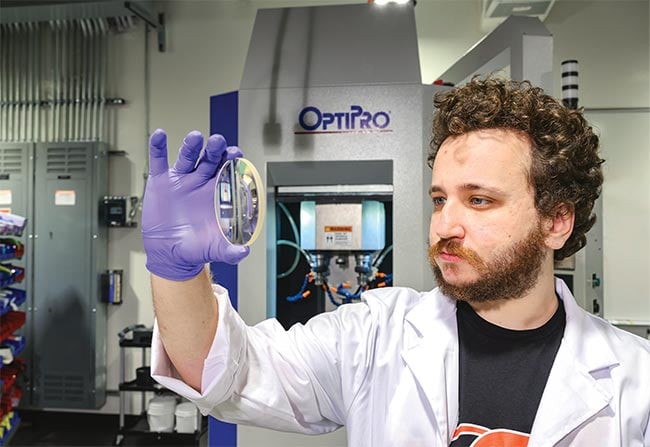
Orlando-based Valencia College’s 15-week optics technician training program is offering much-needed support for the talent pipeline in the optics-rich Central Florida region. Courtesy of Valencia College.
Though the startup does not yet employ any photonics or optical technicians, Middleton plans to hire three to five during the next three years as the company develops its manufacturing capabilities.
While the company is committed to growth, Central Florida’s booming housing market has complicated the development of a robust pipeline of qualified workers for small and mid-size companies. Middleton referred to the case of a recent graduate of an out-of-state doctoral program, who accepted an offer of an engineering position from the company only to relinquish the opportunity after struggling to secure housing. The recent graduate ultimately accepted a position in Georgia.
Competition from major photonics-related defense contractors further hinders smaller employers’ abilities to fill open positions. The recruitment of homegrown talent is vital to the growth plans of Critical Frequency Design as well as dozens of other Florida-based companies serving the optics and photonics industry.
To help meet this need, Orlando-based Valencia College launched a 15-week optics technician training program last September. Although Florida already has five higher education institutions that award photonics and optics-related certificates or degrees, the Valencia College program stands as the first of its kind in the state.
“It is the technician roles that are being vocally requested,” said Barron Mills, executive director of the Florida Photonics Cluster. The organization comprises 75 members, spanning industry and academia, and aims to foster the growth of Florida’s optics and photonics industry
through partnerships with economic development organizations, state universities, community colleges, and local and state governments.
“Engineers with [a] bachelor’s are still a need, but folks to work the manufacturing process and quality control are the greater desire right now. Employers would love for those folks to have an associate degree, but the excitement about the 15-week course shows that they mainly just want quality individuals that they know can be trained,” Mills said.
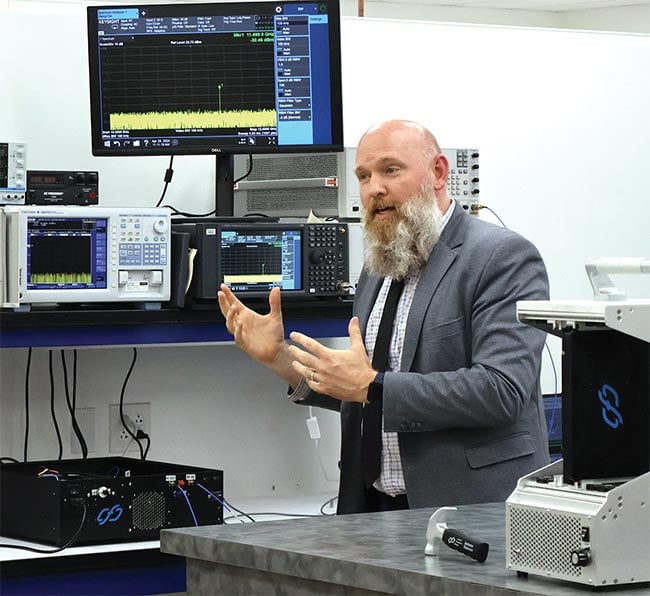
Charles Middleton is CTO of microwave photonics startup Critical Frequency Design. The company is increasing its work in photonic integrated circuit (PIC) design, packaging, and testing. Engineers in these disciplines typically hold a master’s-level degree. Courtesy of Critical Frequency Design.
Regarding technician hiring prospects in his industry, Middleton agrees. “We have a better chance of getting technicians if they already live here and can
get the training they need to do the job,” he said.
Revamping the pipeline
Central Florida is a sizeable optics hub, and it is no surprise that the state — largely driven by the Orlando region — is a leader in awarding undergraduate degrees in optics-related fields. Only
New York-based schools awarded more bachelor’s degrees in optics/optical
sciences and laser and optical engineering than those in Florida in 2022. In New York, the combination of the University of Rochester and the Rochester Institute of Technology contributed to these results. In Florida, meanwhile, the University of Central Florida’s College of Optics and Photonics (UCF CREOL) in Orlando led the field, according to data from the Integrated Postsecondary Education Data System (IPEDS).
New York schools also led the nation in awarding photonics-related associate degrees, with Monroe Community College (MCC), located outside Rochester, N.Y., awarding 21 in laser and optical technology. Indian River State College in Fort Pierce, Fla., awarded 16 associate degrees in electrical/electronic engineering technologies in 2022, according to IPEDS’ data. Indian River has an electrical/electronic engineering technologies program with a specialization option in lasers and photonics.
The comparison of Orlando to Rochester also indicates the prominence of optics and photonics in regional- and state-level industry. Fifty optical instrument and lens manufacturing establishments operated in Florida in 2021, the most recent year that data was reported for this North American Industry Classification System (NAICS). Of those manufacturers, more than half were based in the East Central (Orlando) and West Central (Tampa Bay) regions. New York has 48 optical instrument and lens manufacturing establishments, and its Rochester metropolitan area has 23, according to data from the U.S. Bureau of Labor Statistics.
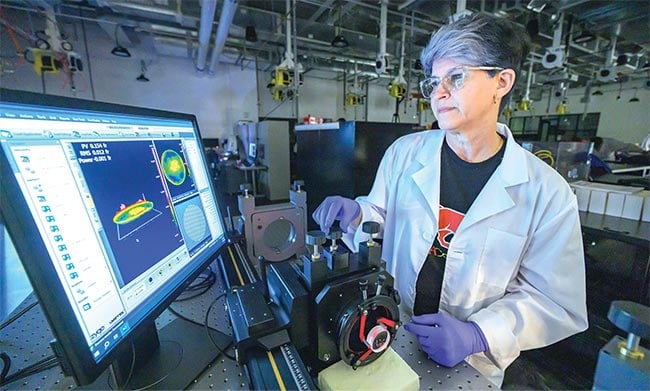
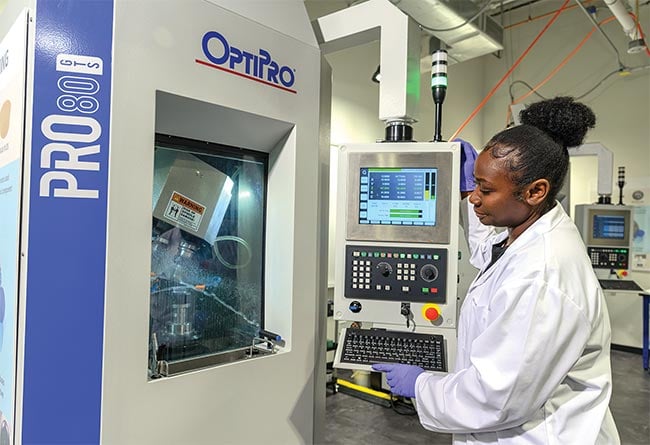
The U.S. Department of Defense-funded American Center for Optics Manufacturing (AmeriCOM) provided $1.5 million for equipment for Valencia College’s precision optics lab. The facility is located at the college’s Osceola Campus in Kissimmee, Florida, outside Orlando. Courtesy of Valencia College.
In many regards, the existing talent pipelines that benefit industry in both states were designed in response to the needs of optics and photonics employers in their respective regions. At the same time, these degree-awarding institutions also directly contribute to the growth of optical instrument and lens manufacturing firms, either through spinout companies, with origins in technology developed at the universities, or via industry attraction efforts. For example, information technology company CACI International recently opened its 13,000-sq-ft facility in Orlando for the manufacturing of laser communications for national security and commercial space missions.
Where New York pulls ahead of Florida is in the certification of laser and photonics technicians. In 2022, MCC lifted New York to second among U.S. states for laser and photonics certificate awards, trailing only behind Michigan. Florida ranked outside the top five for these certification awards, even with four community
colleges statewide offering these certificate awards in 2022.
“Optics manufacturing is late to the advanced-manufacturing training game,” said Josanne DeNatale, national marketing and workforce development operations director for the American Center for Optics Manufacturing (AmeriCOM). The initiative of the U.S. Department of Defense is to promote workforce training at the technician level and assess and address critical gaps in defense systems as well as the optics supply chain and future industry needs.
“AmeriCOM, as it was originally conceived by a group of forward-thinking people in the optics industry, saw that precision optics manufacturing needs to emerge into the advanced manufacturing programs that have long been in place at community colleges across the country,” DeNatale said.
Industry ties
Valencia College’s newly launched program provides 15 weeks of training in optics fabrication, optical assembly, photonics, and fiber optics. The program debuted with AmeriCOM providing
$1.5 million for equipment, and program leadership has worked closely with
AmeriCOM and MCC to develop and optimize the initiative. Valencia has also partnered with several photonics companies with operations in Central Florida for this project, including Lockheed Martin, LightPath Technologies, Ocean Insight, Critical Frequency Design, Jenoptik, and Chronos Photonics.
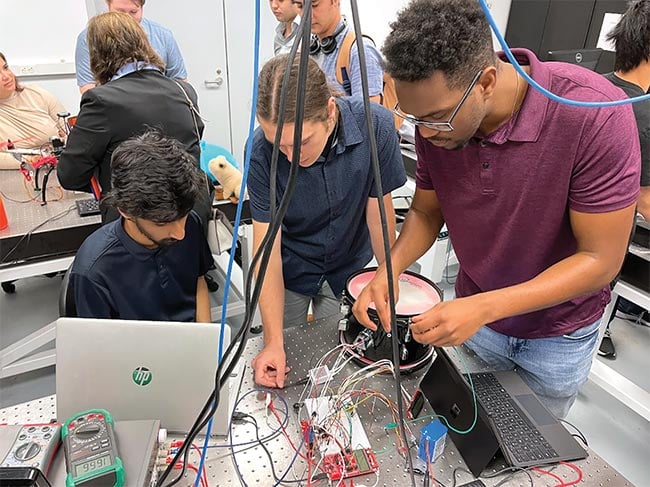
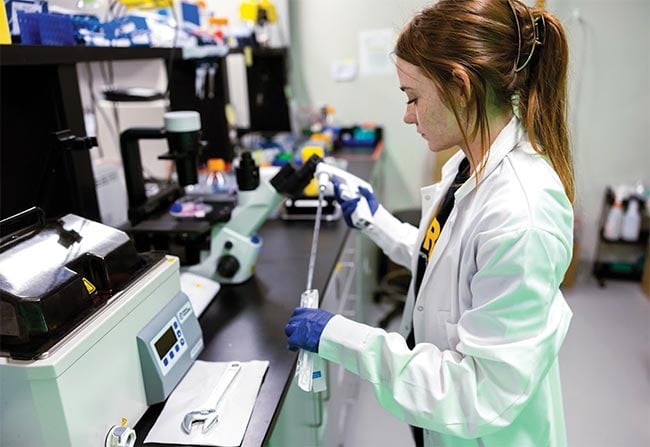
According to David Hagan, dean of the University of Central Florida’s College of Optics and Photonics (UCF CREOL), companies are increasingly recruiting employees with skills
in lens design and thin films and optical materials. The college is considering adding electives in these areas to complement and support its existing courses and degree offerings. Courtesy of UCF.
“Not every student has two years to get a degree to enter a new career field. We specifically try to uplift students in distressed areas in our community so
they can earn a family-sustainable wage,” said Carolyn McMorran, Valencia
College’s assistant vice president of professional and continuing education. The college’s precision optics program, she said, is the sixth accelerated-skills training program in advanced manufacturing that school administrators added to its roster.
“The request for this program came from Lockheed Martin and other local employers who were struggling to hire entry-level technicians,” McMorran said.
Additionally, the need for a rapid onboarding to new, higher-paying career opportunities was a major factor behind Valencia’s decision to pursue the new 15-week program. Some students in the program already have a bachelor’s degree and are pivoting careers. Many students come from low-paying jobs, in industries including hospitality, food service, and ride sharing.
Long-term gains
Valencia’s 15-week course is credentialed, though not credit-bearing. This is different from offerings from other schools within AmeriCOM’s network of partners, which currently includes five institutions of higher learning. Credit-bearing programs allow students with one-year certificate programs to apply earned credits toward the completion of a two-year associate degree. In addition to the credential program, Valencia offers a laser and photonics technician certificate. Additional Florida institutions that offer similar certification programs include Hillsborough Community College, Indian River State College, and Pensacola State College.
“Every college is hoping to be able to implement the 15-week credential — not ‘certification’ — model,” DeNatale said. “The 15-week model works because of how its recruiters build relationships with prospective students and because of how it nimbly responds to the industry needs in its community. All community colleges do this. It is in their charter. But Valencia does it with emerged skill.”
“As a manufacturing company, it is useful for our technicians to have a basic theoretical understanding of optics coupled with hands-on experience using industry equipment (production and test),” said Mark Palvino, vice president of global sales and marketing at LightPath Technologies. “Our needs align well with the curriculums offered by Valencia
College and other like-photonics certificate programs.”
LightPath, a precision optical elements, assemblies, and custom-designed imaging solutions OEM, employs nearly 20 optical technicians at its Orlando facility. Palvino said one of LightPath’s biggest challenges in attracting and retaining optics talent stems from the competition of larger companies that are better positioned to offer higher salaries and more appealing benefit packages as well as more opportunities for career advancement. Middleton cited similar challenges that stem from competition with large defense contractors, such as Northrop Grumman and L3Harris, with Orlando-area operations.
According to Palvino, relationships with UCF CREOL and Valencia College can provide access to a common pipeline of skilled graduates and potential research collaborations. However, upskilling is also critical to recruitment and retention at LightPath.
“On-the-job training programs can help develop talent internally, improving retention rates,” Palvino said.
Several U.S.-based optical instrument and lens manufacturers outside of Florida — Optimax, Archer Optx, and LaCroix Precision Optics are among them —
partner with community colleges for
precision optical manufacturing technician apprenticeships. According to McMorran, Valencia is more focused on pre-apprenticeship programs than bona fide apprenticeship pathways. Pre-
apprenticeship programs last a few weeks or months and provide courses that teach the basic skills required for entry into a U.S. Department of Labor-registered
apprenticeship, which could last several years.
Common job titles for students who complete the Valencia program include optics fabrication technician and optics technician. In 2023, 14 students completed Valencia’s optical technology program. The college is on track to train up to 40 technicians this year.
Filling every need
The optics-related positions that LightPath struggles the most to fill are process and quality engineers. These positions carry a minimum requirement of a bachelor’s degree or equivalent in role-specific experience.
Certain Central Florida schools are looking to precisely accommodate those needs, said David Hagan, the dean of UCF CREOL. Companies are increasingly recruiting employees with skills in lens design and thin films and optical materials from UCF CREOL, he said. According to Hagan, it is likely that the college’s undergraduate program will add more electives targeting those areas.
There are other areas of focus: Middleton said that Critical Frequency Design is increasing its work with photonic integrated circuits (PICs), for example, and that the company needs more employees with experience in PIC design, layout, packaging, and testing. “These positions typically require at least a master’s
degree, but we have hired a few people with bachelor’s degrees and provided
additional training,” Middleton said.
At the bachelor’s level, and driven by industry feedback, UCF CREOL recently introduced project-based learning opportunities for students to complete at the end of each of six laboratory courses. It also added a course for first-year students to serve as an introduction to photonic engineering design. And UCF CREOL’s master’s program recently introduced a fully online offering that serves many professionals in the optics industry.
Currently, the school is exploring the rollout of its own optical technician program to accommodate and ultimately retain students who struggle with courses, such as calculus.
“We envisage a hands-on program in photonics that the student can complete in four years that will prepare them for a technician-level job in the photonics industry,” Hagan said.
“We do not intend to recruit students into this program directly, as it would be better for most to attend Valencia instead.”